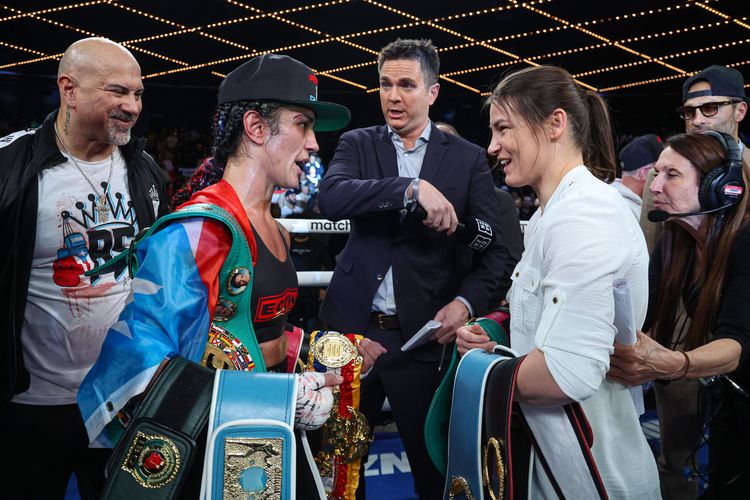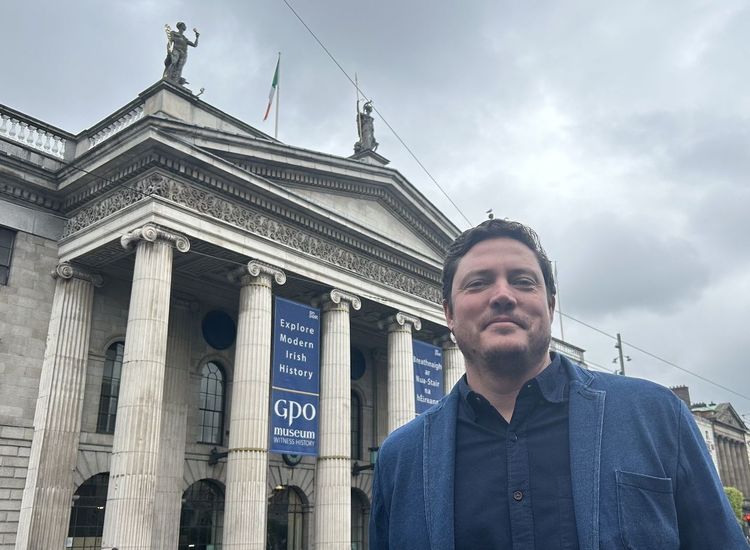Pete Hamill, left, and Jimmy Breslin in a section of a photograph by Brian Hamill used in the 2018 HBO documentary “Breslin and Hamill: Deadline Artists.” Both men were bitterly critical of businessman Donald Trump’s manipulation of New York media outlets and, in Breslin’s phrase, “nitwit reporters.”
Between the Lines / By Peter McDermott
Pete Hamill once wrote: “Mr. Big Name browsing in the Gap among the piles of jeans is not news. If Mr. Big Name throws the former Mrs. Big Name under the Sixth Avenue bus, that is news. Ms. Big Name sitting with friends in a restaurant is not news. If Ms. Big Name takes a job as a salesclerk at Saks, that is news.”
After Hamill died on Aug. 5, 2020, some of New York’s finest journalists remembered that general principle from his time as an editor in the late 20th century and that he applied it to coverage about the man who is currently residing in the White House.
But they didn’t mention, or forgot, that he outlined his philosophy in a 100-page book in 1998, the year after he stopped being a newspaper editor. The very title, “News is a Verb,” was the moral of the story — you had to do something, “something that is surprising, interesting, or new” to warrant being covered in the front pages of the newspaper.
Hamill wasn’t against celebrity coverage. Profiles, for instance, whether they were in People magazine or the New Yorker or Vanity Fair or GQ or wherever were real journalism in his view. “Lytton Strachey’s ‘Eminent Victorians’ should be the model for the form: The pieces are well researched, witty, intelligent, and add to our understanding not only of the human beings sitting for Strachey’s pen but of the era to which they belonged.”
But the endless stream of non-news on Pages 1, 2 and 3 surely only gave the readers the impression, he suggested, that it was more important than the Page 22 news that might have a real-world impact on themselves and their families.
“One entire subgenre flows from the jolly megalomania of New York real estate operator Donald Trump,” Hamill wrote, “There are many real estate people of more solid achievement and greater powers than Trump’s, and certainly many more accomplished businessmen. But such men and women usually prefer to live outside the spotlight; like people who really have money or those with truly interesting sex lives, they don’t brag about them.”
In fact, Hamill revealed that most of the rich and famous he knew — and he said he’d been around them for decades — didn’t set out to be either.
“But Trump flies to the spotlight, even demands it. His motto seems to be, ‘I’m written about, therefore I exist,’” the Brooklyn-born journalist commented in 1998. “He personally telephones gossip columnists and reporters to present to them stories about the wonders of himself, his great love life, his brusque divorces.
“In a way, Trump has his own brilliance. He has a genius for self-inflation, for presenting an illusion of accomplishment that often becomes the accomplishment itself,” according to Hamill. “A tiny solar system now revolves around Trump’s own self-created persona: his ex-wives, Ivana and Marla Trump, followed by his poor teenage daughter, Ivanka Trump, who as I write is being hurled into the world of fashion models under the benevolent gaze of Daddy. This vulgar saga threatens to go on and on.
“No offense against taste is beyond Trump and his journalistic collaborators,” he added, citing in this regard the “nauseating headline” on the front page of the New York Daily News that read: “I WISH I HAD DATED DI.”
Divorce rumored
He continued, “When I was editing the Daily News, I tried to control the virus of which Trump was the local symbol. Trump was not banned from the newspaper, but he did have to do something to appear in its pages. The ‘stories’ slowed to a trickle, and one result was that we were beaten by the New York Post on the story of Trump’s divorce. We had a rumor; they had Trump, speaking as a ‘source close to Trump.’ It was my responsibility and I chose not to run an unverified rumor. I was glad I made that choice. After I was canned, Trump ‘stories’ came back in a fetid rush.”
If Trump was “virtually a genre” all of its own, it was also connected to another, “necrojournalism”: Page 1 stories on people who were long dead, like JFK and Marilyn, or the more recently deceased, such as Jackie Onassis and Princess Di, or, Hamill added, “Frank Sinatra, nearly dead (as contrary as ever, he refused to die); [disgraced sports commentator] Marv Albert, whose career was dead; and of course, Trump, who was brain-dead.”
Actually, Hamill’s bitterest criticism came nine years earlier when Trump took out a full-page ad in four newspapers in the midst of the Central Park jogger case in which he called for the return of the death penalty.
"Snarling and heartless and fraudulently tough, insisting on the virtue of stupidity, it was the epitome of blind negation,” Hamill wrote about the ad.
Meanwhile, Jimmy Breslin wrote, “Beware always of the loudmouth taking advantage of the situation and appealing to a crowd's meanest nature.”
(The convictions in the case of the rape and the beating that almost killed the victim were overturned in 2002, after DNA evidence exonerated the five men, all of whom were minors at the time of their false confessions to the crime.)
Breslin was also a critic of Trump’s general media style, saying he handled “nitwit reporters with a new and most disgraceful form of bribery.”
So, some of the most famous and astute columnists were on to Trump early. And a few others were digging. One of the most celebrated of New York’s investigative journalists, Wayne Barrett, wrote a biography of Trump in 1992. He’d been interviewing him since the late 1970s. The book was republished in 2016 with the title “Trump: The Greatest Show on Earth: The Deals, the Downfall, the Reinvention.” Barrett died the day before Trump was inaugurated in 2017. His Times obituary said that once “after crashing one of Mr. Trump’s birthday parties to see who had been invited, he was arrested by the Atlantic City police and charged with trespassing.”
Barrett’s was the original but there were several other serious books with portraits that, when looked at again in 2016, shouted: “This man should not be elected town dog-catcher, much less American president.”
Even Tony Schwartz, the ghostwriter for Trump’s own “The Art of the Deal,” made pleas to the electorate that somehow evoked Kevin McCarthy’s Dr. Miles Bennell screaming warnings at the traffic in “Invasion of the Body Snatchers.”
Candidates derailed
Trump emerged as a celebrity in the post-Watergate era when political figures became the subject of fierce scrutiny once they declared for “national office.” They were constantly battling to shape perceptions and to avoid being defined in a negative light by the national political press corps. It was in this context that two candidacies in the 1988 presidential election were derailed even before the first primary took place — those of Senators Gary Hart and Joe Biden, both big players in Washington — by indiscretions that together would constitute a slow news week for reporters covering Trump world.
However, Trump got to define himself before he was in politics, with the help of those “nitwit reporters.” When he decided to run for national office, as he’d for years threatened to do, he’d been long adept at attracting attention and at changing the storyline of the day, as needed. And by then, those who signed on to the brand had been somehow vaccinated — making them immune from revelations about the sheer awfulness of the man from people like his niece, Mary Trump, and his former lawyer, Michael Cohen, to take a couple of recent examples,
Hamill wrote, “The celebrity virus has infected people who are supposed to be more neutral.” He said that it was the age of the prosecutor, whereas 30 years before Americans identified more with a defense attorney in the Perry Mason mold. As evidence, he offered that the prosecutor who lost in the O.J. Simpson murder trial got a bigger book deal than the defense attorney who won.
After sympathetic coverage in the newspapers and the book deal, the “greatest of all American lotto tickets,” what’s next for the person in the public eye?
“Beyond that, they can run for higher office,” Hamill wrote in 1998, “In the world of celebrity, anything is possible.”










